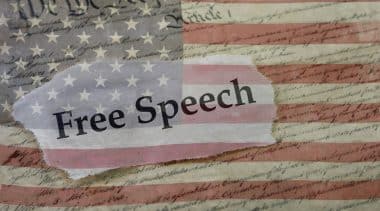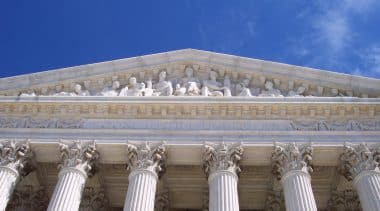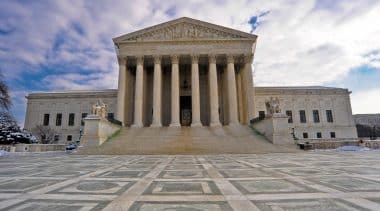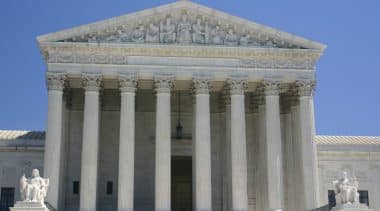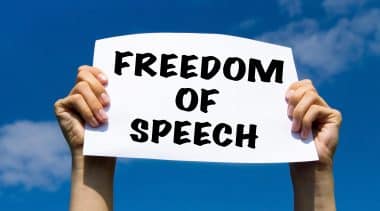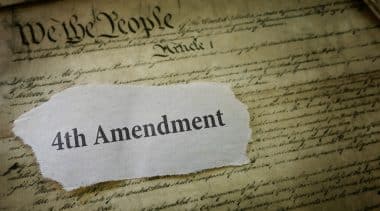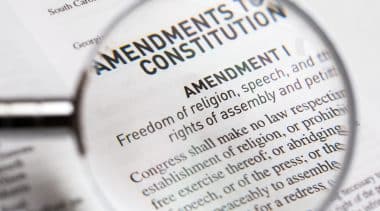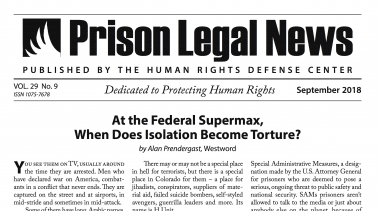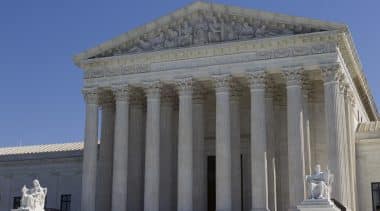-
Amicus Brief: West v. Winfield
The reasoning embraced by the Ninth and Second Circuits—requiring a Section 1983 plaintiff to point to a decided case with identical, or nearly so, factual allegations in order to defeat qualified immunity—sets an impossible standard
-
Amicus Brief: Torres v. Madrid
This Court should reverse the Tenth Circuit and return uniformity and predictability to the Court’s Fourth Amendment jurisprudence.
-
Amicus Brief: Fleck v. Wetch
The case warrants this Court’s review because many state and local governments are refusing to comply with Janus’ waiver requirement.
-
Amicus Brief: Salgado v. United States
Because lower courts have charted a course around CAFRA’s fee-shifting provision, inefficient and unmeritorious civil asset forfeiture actions are not adequately deterred.
-
Amicus Brief: Shaffer v. Pennsylvania
This Court should grant the petition for a writ of certiorari to clarify the applicability — if any — of the “private search” doctrine to today’s digital world.
-
Amicus Brief: Valent v. Commissioner of Social Security
The Supreme Court should take this case to resolve the question of what tools the lower courts must employ in a search for the meaning of a statute.
-
Amicus Brief: Espinoza v. Montana Department of Revenue
The Supreme Court should act to protect religiously neutral student-aid programs from lower court rulings and state government actions that run afoul of the federal constitution.
-
Amicus Brief: Competitive Enterprise Institute and National Review v. Michael E. Mann
If this were the law anywhere in the country, it would represent a profound danger to free speech and debate.
-
Amicus Brief: US District Court Should Dismiss the Indictment in US v. Lacey, et al
The government may not prosecute a speaker for his or her speech unless and until the government establishes that the speech is not protected.
-
Amicus Brief: Court Ruling ‘Allows Police Officers to Steal From Suspects With Impunity’
By insulating even egregious misconduct from liability whenever there is no prior case specifically on point, the panel’s reasoning extends qualified immunity doctrine to its extreme.
-
Amicus Brief: Supreme Court Should Hear Montana School Choice Case, Espinoza v. Montana Department of Revenue
This court should grant the petition to provide legal clarity for the many states seeking to increase educational opportunities for all children.
-
Amicus Brief: Law Enforcement, Without a Warrant, Strip-Searched and Photographed a Four-Year-Old Girl at Her Preschool
Qualified immunity denies justice to victims of unconstitutional misconduct. It imposes cost-prohibitive burdens on civil-rights litigants. And it harms the very public officials it seeks to protect.
-
Amicus Brief: Mitchell v. Wisconsin
The court should reject Wisconsin’s claim that it can impute consent sufficient to sustain a warrantless search merely from an individual’s choice to drive on the state’s roadways.
-
Amicus Brief: Backpage.com Is Presumptively Protected by the First Amendment
The government’s unconstitutional seizure of assets and proceeds from Backpage.com and weekly newspapers is an attempt to erode the First Amendment’s carefully erected bulwarks around free expression.
-
Amicus Brief: Abbott v. Pastides
The Supreme Court should make clear that public universities violate the First Amendment by subjecting their students to investigations for having exercised their First Amendment rights.
-
Amicus Brief: St. Bernard Parish Government v. United States
This Court should grant the landowners’ petition for certiorari because Judge Dyk’s opinion for the Federal Circuit panel adopted two novel exclusionary rules that are contrary to this Court’s Takings Clause jurisprudence.
-
Amicus Brief: Prison Legal News v. Secretary, Florida Department of Corrections
Florida’s censorship of Prison Legal News amounts to an impermissible effort to imprison not only the body but also the mind.
-
Amicus Brief: Delano Farms Co. v. California Table Grapes Commission
The point of this brief is to examine how we got to this unusual place and to propose that the Court treat forced subsidies for generic advertising the same way it treats other forced subsidies for speech.


